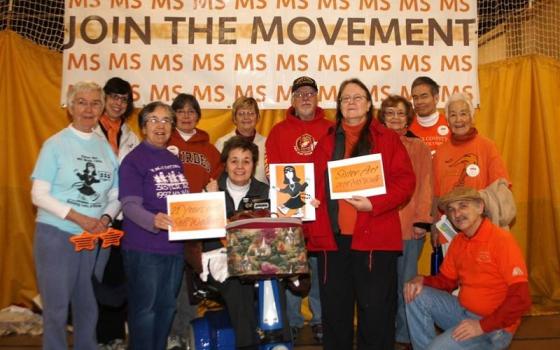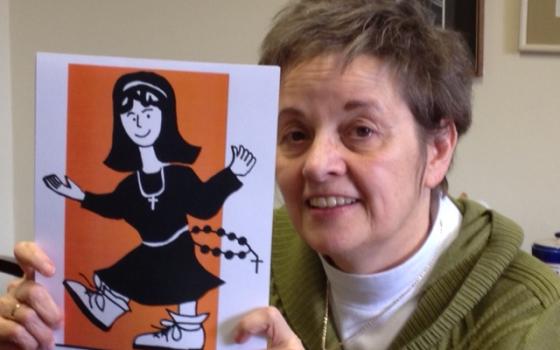I hate asking for money.
Whether it's telling a friend she owes me for the book I picked up for her at the bookstore, or the laundry detergent that was on sale at my grocery store, it is not one of my favorite things to do. I do it, because it's a matter of justice, and I need the money since I usually owe somebody else!
Francis was a beggar
Francis of Assisi was poor before God and his society. Francis' dream for his order of friars was that they would embrace the vows of poverty, chastity and obedience, and he saw these as an expression of Christ in the Gospel. Francis lived his life as a mendicant and itinerant preacher, supporting the life of his order with manual labor and begging.
I had always read that Francis asked for alms, but it never hit me that this phase of the Franciscan tradition is really alive in my own life today.
Translated to the 21st Century
It is no secret that to do good works, to help people out who are less fortunate or who do not have resources — takes resources. Whether it is helping those living without housing or food, or helping people break out of the circle of poverty through education — this is the stuff of Franciscanism. To help those in need.
There are many charities and nonprofit organizations who need help. Sometimes organizations need my time (which is a big gift from me), sometimes my writing skills, or my asking for donations. Other times, they just need encouragement. I once heard it said that some give time, and some give treasure, but we all have something to give. For a Franciscan, this is a wonderful, hopeful idea!
So, for me, helping to raise money is truly consistent with Franciscan spirituality and tradition. Getting started on each fundraiser takes a lot of initial energy for me, like the emotional energy it takes to dive into a lake of cool water. But I do it. I feel acid drop in my stomach any time I hear that a fundraiser is approaching. It isn't easy for me to beg, to ask for money or donations of time.
So many people say to me, "But you ask for money and get donations all the time." If they would take time to sit down with me, I would share with them that it takes a lot of my energy. I still get that nervous little butterfly feeling inside right before I ask for help.
On the congregational level, I work with our associates and host a fundraiser for our sponsored ministry, Bethany House, a long-term shelter for abused women and their children. Bethany is a nonprofit charity whose religious and lay volunteers serve women, ensuring their safety, helping them attain living wage jobs and providing a healthy and safe home environment for their children. Some volunteer services include resume writing and job interviewing skills; preparation programs for high school equivalency exams; parenting classes and counseling; mentoring women or families and tutoring children; facilitating support groups for victims of abuse; teaching computer keyboarding or software programs; job education and enrichment programs; gathering household items; coordinating recreational therapy and resource links to other agencies and services.
I ask people for money donations, help with publicity and try to support the event's planning committee. Often, a big gift to any nonprofit involved in fundraising is support and encouragement. It seems that right before an event, we all get quite discouraged and wonder if it will work out. I can imagine Francis' followers on many a night in Assisi wondering if they would have enough to eat. But despite it all, Francis encouraged the brothers.
The dynamic of the "ask"
Whenever I see a sign-up sheet on a wall, I think "what an impersonal way to ask for help!" Sometimes it is just a matter of convenience to put up a note, but there is something important about being approached by another person. When someone comes up to us and asks us if we will read for a liturgy, or bake cookies for a sale, or sell tickets at the door, we might think, "Oh boy, one more thing to do … " but we are still honored to be included, to be asked.
"An ask" is relational, Franciscan to the core. When I ask someone to help with a cause I believe in, I always get a generous response. It still takes energy from me to ask personally, but again, that is how fundraising succeeds. People give time and talents to people. To me, asking and giving in this way is Franciscan begging.
The needs are there
My personal involvement with begging in today's world started with the Northwestern Ohio Chapter of the National Multiple Sclerosis (MS) Society. I have MS, and at first it was just a nonprofit organization that needed help. When I saw how the MS Society helped clients with services — funds to help with medication costs, heat bills, telephone fees, etc. — I was in all the way!
My own sisters have generously responded to the MS Society here. For the past 25 years, we have had a team of anywhere from seven to 24 sisters and associates who walk in early spring and raise money for those with MS. Maybe it is luck, but I tend to think it is the Franciscan Spirit of 21st century begging that saw our team win the "most money raised" title of the past 10 years.
Modern day Franciscan or other begging still takes place. For me, it is the underlying basis of why I get involved in fundraisers. Since I cannot build homes for Habitat for Humanity, or work in Haiti or Tanzania because of my health limitations, I am going to do everything in my life to ensure that these good works can continue.
"I'm not going to beg!"
We are very well educated today, and sometimes the word begging is not too comfortable. It does take a bit of humility. Some people are better at it than others. As our communities grow older and smaller, many of us work in development or advancement offices. Sometimes our own sisters staff the office, but often lay partners do, too.
To continue the Franciscan mission, we need resources. We must be involved in this 21st century job of begging for alms to do good works. Our congregational advancement efforts include an annual gala dinner in the fall, and other programs. We ask people to be our partners in doing good works, but need to ask for the resources to do that. I have committed myself entirely to our advancement efforts. I think Francis would approve.
[Karen Jean Zielinski is a member of the Sisters of St. Francis of Sylvania, Ohio. She sometimes writes for Healthy Living News — a local health magazine — and is regularly published in two national magazines. Her first book, Hope and Help for Living With Illness deals with health and spirituality. She is co-director of associates and director of Canticle Studio, a creative office of products that focus on spirituality and health.]


